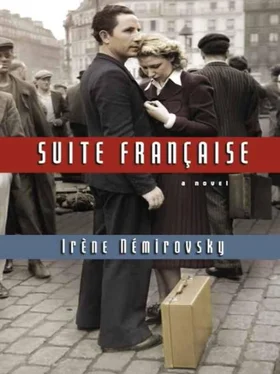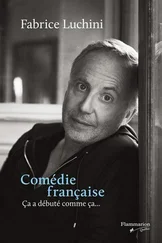But he didn't want to think about that, not today. He preferred to enjoy the idea of the ball, or to dream about things he could never have: Lucile by his side, for example… Lucile who could come with him to the ball… "It's madness," he said to himself, smiling. "Oh, I don't care. In my soul I'm free." He imagined the dress Lucile would wear: not a modern dress, but the kind you might find in some romantic print; a white dress with layer upon layer of chiffon, billowing out like a flower, so that when he danced with her, when he held her in his arms, he could feel the frothy lace brushing against his legs. He went pale and bit his lip. She was so beautiful… Lucile close to him, on a night like this, in the Montmorts' grounds, with the fanfares playing and fireworks in the distance… Lucile who, above all, would understand and share the almost religious thrill he felt in his soul when, standing alone in the dark, he felt the distant presence of a vague and terrible multitude-the regiment, the soldiers-and even further away, the army that fought and suffered, and the victorious army that occupied the cities.
"With her," he said to himself, "I would be inspired." He had worked very hard. He used to live in a state of perpetual creative exaltation, mad about music, he would say, laughing. Yes, with her and a little freedom, a little peace, he could have done great things. "It's such a shame"-he sighed-"such a shame… one of these days we'll receive orders to leave and we'll be at war again. There will be other people, other countries, such extreme physical exhaustion that I'll never be able to finish my military career. And the music, still waiting to find expression. Musical phrases, delightful chords, subtle dissonances stand poised… wild, winged creatures frightened off by the crash of weapons. It's such a shame. Did Bonnet care about anything besides war? I have no idea. No one can ever truly know another human being. But what if… he… who died at the age of nineteen, found more fulfilment than me, who's still alive?"
He stopped in front of the Angelliers' house. He was home. In three months he had come to think of all this as his own: the iron door, the prison-like lock, the hall with its musty smell, the back garden-the garden bathed in moonlight-and the woods in the distance. It was a June evening, divinely sweet; the roses were in bloom, but even their perfume was overpowered by the smell of hay and strawberries that hovered everywhere since the day before, for it was harvest time. On the road, the Lieutenant had come across some wagons full of freshly cut hay, drawn by cattle as there were no horses left. He had silently admired the slow, regal pace of the cattle pulling their sweet-smelling goods. The farmers looked away as he went past; he had noticed… but… he felt happy again and light-hearted. He went into the kitchen and asked for something to eat. The cook served him unusually quickly and without replying to his pleasantries.
"Where is Madame?" he said finally.
"I'm here," said Lucile.
She had come in without making a sound as he was finishing a slice of cured ham on a big piece of fresh bread.
He looked up at her. "You're so pale," he said softly, sounding worried.
"Pale? Not really. It's just been very hot today."
"Where is your good mother?" he asked, smiling. "Let's go for a walk outside. Meet me in the garden."
A little later, as he was walking slowly down the wide path, between the fruit trees, he saw her. She came towards him, her head lowered. When she was a few steps away, she hesitated. Then, as she always did as soon as they were hidden from sight by the great lime tree, she went up to him and slipped her arm through his. They walked a while in silence.
"They've cut the hay in the meadows," she said finally.
He closed his eyes, breathed in the aroma. The moon was the colour of honey in a milky sky where wispy clouds drifted by. It was still light out.
"It will be nice weather tomorrow, for our celebration."
"Is it tomorrow? I thought…"
She didn't finish what she was saying.
"Why not?" he said, frowning.
"Nothing, I just thought…"
He nervously flicked at the flowers with the riding crop he was holding.
"What are people saying?"
"About what?"
"You know very well. About the crime."
"I don't know. I haven't seen anyone."
"And what about you? What do you think?"
"That it's terrible, of course."
"Terrible and incomprehensible. After all, what have we, as people, done to them? It's not our fault if we upset them sometimes, we're just following orders; we're soldiers. And I know for a fact that the regiment did everything possible to behave properly, humanely, didn't they?"
"Certainly."
"Naturally, I wouldn't say this to anyone else… Among soldiers it's understood that we don't show pity towards a comrade who's been killed. That would go against military thinking, which requires that we consider ourselves solely as part of a whole. Soldiers can die just so long as the regiment lives. That's why we're not postponing tomorrow's celebration," he continued. "But I can tell you the truth, Lucile. My heart breaks at the thought of this nineteen-year-old boy being murdered. He was a very distant relative of mine. Our families know each other. And then, there's something else I find stupid and revolting. Why did he have to shoot the dog, our mascot, our poor Bubi? If I ever find that man, I'd happily kill him with my bare hands."
"I expect that's what he must have been saying to himself for a long time," Lucile said softly. "If I ever got my hands on one of those Germans, or even one of their dogs, how happy I'd be!"
They looked at each other, dismayed; the words had slipped through their lips, almost against their will.
"It's the same old story," said Bruno, forcing himself to sound lighthearted. "Es ist die alte Geschichte. The conquerors don't understand why people want nothing to do with them. After 1918, you tried in vain to make us believe that we were stubborn because we couldn't forget our sunken fleet, our lost colonies, our destroyed empire. But how can you compare the resentment of a great nation with one farmer's blind outburst of hatred?"
Lucile picked a few sprigs of mignonette, smelled them, crushed them in her hands. "Has he been caught?" she asked.
"No. Oh, he'll be long gone by now. None of these good people would dare hide him. They know only too well they'd be risking their own lives and they're fond of their lives, aren't they? Almost as fond of their lives as their money…"
Smiling slightly, he looked around at all the low, squat, secret houses slumbering in the dusk. She could see he was imagining them full of chatty and emotional old women, prudent and nit-picking middle-class ladies, and further away, in the countryside, farmers who were more like animals. It was almost true, partly true. Yet there remained something shadowy, mysterious, impossible to articulate, and over which, Lucile suddenly thought, remembering something she'd read at school, "even the proudest tyrant will never rule."
"Let's walk on a bit further," he said.
The path was lined with lilies; their silky buds had burst open under the last rays of the sun and now the sweet-smelling flowers blossomed proudly in the night air. During the three months they had known each other, Lucile and the German had taken many walks together, but never in such splendid weather, so conducive to love. By tacit agreement they tried to forget everything except each other. "It's nothing to do with us, it's not our fault. In the heart of every man and every woman a kind of Garden of Eden endures, where there is no war, no death, where wild animals and deer live together in peace. All we have to do is to reclaim that paradise, just close our eyes to everything else. We are a man and a woman. We love each other."
Читать дальше

![Константин Бальмонт - Константин Бальмонт и поэзия французского языка/Konstantin Balmont et la poésie de langue française [билингва ru-fr]](/books/60875/konstantin-balmont-konstantin-balmont-i-poeziya-francuzskogo-yazyka-konstantin-balmont-et-thumb.webp)










